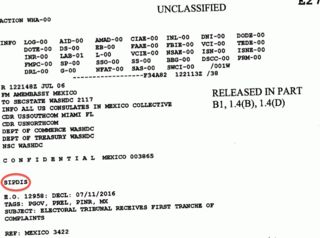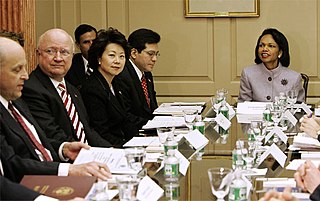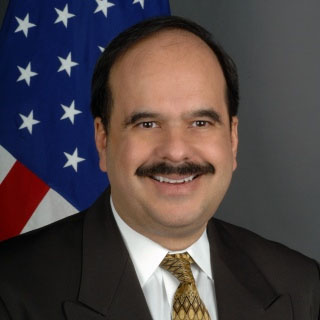
The Secure Internet Protocol Router Network (SIPRNet) is "a system of interconnected computer networks used by the U.S. Department of Defense and the U.S. Department of State to transmit classified information by packet switching over the 'completely secure' environment". It also provides services such as hypertext document access and electronic mail. As such, SIPRNet is the DoD's classified version of the civilian Internet.

Sicko is a 2007 American political documentary film by filmmaker Michael Moore. Investigating health care in the United States, the film focuses on the country's health insurance and the pharmaceutical industry. Moore compares the for-profit non-universal U.S. system with the non-profit universal health care systems of Canada, the United Kingdom, France and Cuba.

Christopher William Dell is a career United States Foreign Service officer who served as the U.S. Ambassador to Angola, Zimbabwe, and Kosovo.

James Caldwell Cason is a retired United States Foreign Service officer, most recently serving as Ambassador to Paraguay, a post he held from 2006 to 2008. Prior to that post, he was the Principal Officer of the US Interests Section in Havana (2002–2005). On January 20, 2011, he became the new mayor of Coral Gables, Florida.

The United States Interests Section of the Embassy of Switzerland in Havana, Cuba or USINT Havana represented United States interests in Cuba from September 1, 1977, to July 20, 2015. It was staffed by United States Foreign Service personnel and local staff employed by the US Department of State, and located in a multi-story office building on the Malecón across from the Plaza de la Revolución in Havana. The mission resumed its role as the Embassy of the United States in Cuba on July 20, 2015, following the normalization of diplomatic relations between the two countries.

The United States Commission for Assistance to a Free Cuba (CAFC) was created by United States President George W. Bush on October 10, 2003, to, according to him, explore ways the U.S. can help hasten and ease a democratic transition in Cuba.

Alberto Miguel Fernandez is a Cuban-American former diplomat. He was the head of the Middle East Broadcasting Networks (MBN), which includes Alhurra. Fernandez is currently vice president of the Middle East Media Research Institute, a position he held 2015-2017.
Mary Thompson-Jones is a retired senior Foreign Service Officer in the United States' Department of State. In July 2016, she published her first book, To The Secretary: Leaked Embassy Cables and America's Foreign Policy Disconnect.

Roderick Wemple Moore is the former Raymond Spruance Professor of National Security Affairs at the U.S. Naval War College in Newport, RI, from 2013 to 2015. During the latter part of 2015, he served as the Chargé d'Affaires of the U.S. Embassy in Sofia, Bulgaria. From 2010 to 2013, he was the Principal Deputy High Representative and Brcko District Supervisor at the Office of the High Representative (OHR) in Sarajevo, Bosnia and Herzegovina. Prior to beginning his assignment at OHR, Moore served for three years (2007–2010) as the first American Ambassador to Montenegro. He was nominated for that posting by President George W. Bush and confirmed by the U.S. Senate on June 29, 2007. Senator Barack Obama chaired the Senate confirmation hearing in June 2007 at which Ambassador-designate Moore testified. Then Under-Secretary of State for Political Affairs, R. Nicholas Burns, swore him in on September 12, 2007, in the Treaty Room of the State Department. He arrived in Montenegro and presented his credentials to Montenegrin President Filip Vujanović on September 18, 2007. He left post in August 2010.
The United States diplomatic cables leak, widely known as Cablegate, began on Sunday, 28 November 2010 when WikiLeaks began releasing classified cables that had been sent to the U.S. State Department by 274 of its consulates, embassies, and diplomatic missions around the world. Dated between December 1966 and February 2010, the cables contain diplomatic analysis from world leaders, and the diplomats' assessment of host countries and their officials.
Contents of the United States diplomatic cables leak depict subjects in the Americas extensively. The leaks, which began on 28 November 2010, occurred when the website of WikiLeaks—an international new media non-profit organisation that publishes submissions of otherwise unavailable documents from anonymous news sources and news leaks—started to publish classified documents of detailed correspondence — diplomatic cables — between the United States Department of State and its diplomatic missions around the world. Since the initial release date, WikiLeaks released further documents every day.
Contents of the United States diplomatic cables leak has depicted Europe and related subjects extensively. The leak, which began on 28 November 2010, occurred when the website of WikiLeaks—an international new media non-profit organisation that publishes submissions of otherwise unavailable documents from anonymous news sources and news leaks—started to publish classified documents of detailed correspondence—diplomatic cables—between the United States Department of State and its diplomatic missions around the world.
Content from the United States diplomatic cables leak has depicted Saudi Arabia and related subjects extensively. The leak, which began on 28 November 2010, occurred when the website of WikiLeaks — an international new media non-profit organization that publishes submissions of otherwise unavailable documents from anonymous news sources and news leaks — started to publish classified documents of detailed correspondence — diplomatic cables — between the United States Department of State and its diplomatic missions around the world. Since the initial release date, WikiLeaks is releasing further documents every day.
Content from the United States diplomatic cables leak has depicted Asia and Oceania subjects extensively. The leak, which began on 28 November 2010, occurred when the website of WikiLeaks — an international new media non-profit organisation that publishes submissions of otherwise unavailable documents from anonymous news sources and news leaks — started to publish classified documents of detailed correspondence — diplomatic cables — between the United States Department of State and its diplomatic missions around the world. Since the initial release date, WikiLeaks is releasing further documents every day.
Content from the United States diplomatic cables leak has depicted Pakistan and related subjects extensively. The leak, which began on 28 November 2010, occurred when the website of WikiLeaks – an international new media non-profit organisation that publishes submissions of otherwise unavailable documents from anonymous news sources and news leaks – started to publish classified documents of detailed correspondence – diplomatic cables – between the United States Department of State and its diplomatic missions around the world. Since the initial release date, WikiLeaks is releasing further documents every day.
Content from the United States diplomatic cables leak has depicted India and related subjects extensively. The leak, which began on 28 November 2010, occurred when the website of WikiLeaks – an international new media non-profit organisation that publishes submissions of otherwise unavailable documents from anonymous news sources and news leaks – started to publish classified documents of detailed correspondence – diplomatic cables – between the United States Department of State and its diplomatic missions around the world. Since the initial release date, WikiLeaks had been releasing further documents daily.
Content from the United States diplomatic cables leak has depicted Australia and related subjects extensively. The leak, which began on 28 November 2010, occurred when the website of WikiLeaks — an international new media non-profit organisation that publishes submissions of otherwise unavailable documents from anonymous news sources and news leaks — started to publish classified documents of detailed correspondence — diplomatic cables — between the United States Department of State and its diplomatic missions around the world. WikiLeaks was releasing documents each day since the initial release date, but published the entire collection unredacted following the partially accidental publication of the passphrase to the symmetrically encrypted GPG file WikiLeaks had placed online and provided to The Guardian. The journalists had published the passphrase as the title of a chapter in a book on the process of investigating and publishing the stories believing that the encrypted file had only been provided to them with that passphrase and not realising the entire encrypted file was still online.
Mara Tekach, a career member of the Senior Foreign Service, was the Chargée d’Affaires at the U.S. Embassy in Havana, Cuba, from 2018 to 2020.







